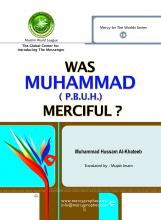The Prophet of Mercy Website
Muslim World League - Global Commission for Introducing the Messenger
This could be perceived through the deeds practised by the Muslims at Al-Hudaibiyah ‘Umrah (Lesser Pilgrimage) during which ‘Urwah bin Mas‘ud Al-Thaqafi saw certain Muslims tend to pick up any expectoration that fell down from the Prophet Õáì Çááå Úáíå æÓáã . He also saw them race to the water of his ablution and they almost quarrelled for it. There were others who competed to pledge allegiance to death and some others pledged not to flee from (the battlefield). Among those people, were eminent Companions like ‘Umar and Abu Bak, who although dedicated all their lives to the Prophet (Peace be upon him) and to the cause of Islam, but refused to carry out the Messenger’s ordres with respect to slaughtering sacrificial animals after the ratification of Al-Hudaibiyah Peace Treaty, the thing that perturbed and caused the Prophet (Peace be upon him) to feel anxious. However, when Umm Salamah (May Allah be pleased with her) advised that he take the initiative and sacrifice his animals, his followers raced to follow his example; a clear evidence in support of the saying: Actions speak louder than words, in the process of exterminating a deeply-established tradition.
Hypocrites aroused a lot of suspicions and made a broad false propaganda against that marriage. Their acts and talks about that marriage had ill-effects on those Muslims whose Faith was still weak, particularly that Zainab was the fifth wife — and the Noble Qur’ân limited the number up to four only; Zaid was traditionally his son, and so a father marrying his son’s divorcee was a heinous sin in the eyes of the Arabians.
Al-Ahzab Surah was revealed to shed full light on the two issues, i.e. Islam does not recognize adoption of children, and the Prophet (Peace be upon him) is given (by Allâh) more freedom as regards the number of wives he can hold than other Muslims in order to achieve noble and honourable purposes.
However, the treatment of the Messenger of Allâh (Peace be upon him) to his wives was of honourable, noble, and superb nature. His wives were on tops in respect of honour, satisfaction, patience, modesty, and service (that is to say the performance of housework and marriage duties). Although the Messenger’s house-life was hard and unbearable, none of his wives complained. Anas said about the Prophet’s life: “According to my knowledge, the Messenger of Allâh (Peace be upon him) has never tasted a thin flattened loaf in all his lifetime, nor has he ever seen with his own eyes roasted mutton.”
‘Aishah said: “Over two months have elapsed — during which we have seen three crescents — and yet no fire has been kindled in the houses of the Messenger of Allâh (Peace be upon him) (i.e. they did not cook food).” “What did you eat to sustain yourselves?” ‘Urwah asked. She said “The two blacks: dates and water”. Lots of information about the hard life of the Prophet (Peace be upon him) were told.
In spite of these hardships, straits and adversity of life in the house of the Prophet (Peace be upon him), none of his wives uttered a word of complaint worthy of reproach — but once. This exception was required by human instinctive inclinations. However, it was not so important and consequently it did not require the decree of a legislative rule. Allâh has given them an opportunity to choose between two things, as clearly stated in the following verses:
“O Prophet [Muhammad (Peace be upon him) ]! Say to your wives: ‘If you desire the life of this world, and its glitter, — then come! I will make a provision for you and set you free in a handsome manner (divorce). But if you desire Allâh and His Messenger, and the Home of the Hereafter, then verily, Allâh has prepared for Al-Muhsinat (good doers) amongst you an enormous reward.’” [33:28,29]
They were so noble and honest that none of them preferred ‘the life of this world and its glitter’ to the abode in the Hereafter.
Although they were many in number, nothing of the dispute occurrences that normally happen among co-wives, took place in their houses. Very few cases could be the only exception; but they were quite normal. Allâh reproached them for that, so they ceased to do such a thing. This incident is mentioned in At-Tahreem Chapter:
“O Prophet! Why do you ban (for yourself) that which Allâh has made lawful to you …” [66:1] (to the end of the fifth verse).
Discussing polygamy — in my opinion — is not a necessity; since a person who is familiar with the Europeans, and indecent practices, sufferings, wickedness, their sorrows and distresses, the horrible crimes they commit in this respect as well as the trials, the disasters that they are involved in, and which emanate directly from their disregard of the principle of polygamy form a good reason (to justify the soundness of polygamy). The distorted picture of life in Europe with the ill-practices featuring it, could truthfully justify the existence and practice of polygamy. In this, there are Divine signs for all people possessed of lucid mind.
******






